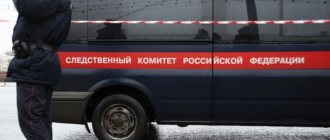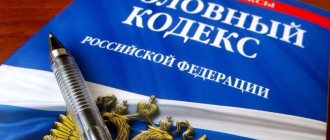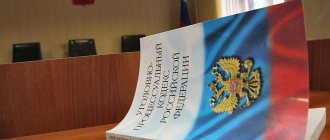Art.
208 of the Code of Criminal Procedure of the Russian Federation is a very significant article of the Criminal Procedure Code of the Russian Federation. Its main task is to regulate the procedure for terminating the preliminary investigation. In this article you will learn about what type of investigation this is, why it is needed in criminal procedural law, and you will also learn about the basic rules and deadlines for terminating an investigation and how Art. 208 of the Code of Criminal Procedure of the Russian Federation is used in judicial practice. Multi-channel free hotline Legal advice on criminal law. Every day from 9.00 to 21.00
Moscow and region: +7 (495) 662-44-36
St. Petersburg: +7 (812) 449-43-40
The concept, essence and meaning of suspension of the preliminary investigation
Suspension of a preliminary investigation is a temporary break in the investigation of circumstances subject to proof in a criminal case, during which the investigator (inquiry officer) takes measures to eliminate the circumstances that caused the suspension in the investigation of the criminal case.
For the first time, the suspension of the preliminary investigation as an institution of domestic criminal procedural law was developed and included in the Charter of Criminal Proceedings, adopted in 1864 in the form of suspension of charges (criminal prosecution) and existed practically unchanged until the beginning of the twentieth century. Subsequently, it was adopted by the criminal procedural codes of the RSFSR of 1922 and 1923. a distinctive feature of which, as well as the Charter, was the fact that the issue of suspending criminal proceedings could be resolved only by the court. Later in the Code of Criminal Procedure of the RSFSR 1960
The decision to suspend the case began to be made by the preliminary investigation body itself.
At the present stage of development of the domestic criminal process, the institution of suspension of criminal proceedings is associated with the establishment by law of the terms of the preliminary investigation and the strict procedure for their extension.
Despite its great elaboration and perfection, the current Code of Criminal Procedure of the Russian Federation, just like its predecessors, does not contain the formulation of the concept of suspension of a preliminary investigation, while the legislator uses various designations that do not change the essence of this legal institution: suspension of a preliminary investigation, suspension of criminal proceedings case (Articles 208, 238 of the Code of Criminal Procedure of the Russian Federation). Regarding the suspension of the inquiry, the Code of Criminal Procedure of the Russian Federation does not contain any reservations, having extended to this category of criminal cases in full, without exception, the procedure established by Chapter 28 of the Code of Criminal Procedure of the Russian Federation.
Specifics of suspension of the preliminary investigation. The specificity of the legal institution under consideration is associated with the absence of the main participants in the case - the suspect or accused, or the inability to carry out investigative or procedural actions with them until procedural obstacles are eliminated or the need to carry out additional investigative actions.
According to Part 3 of Art. 162 of the Code of Criminal Procedure of the Russian Federation, the time during which the proceedings were suspended is not included in the period of preliminary investigation.
To eliminate the unjustified extension of the investigation period when these circumstances arise, the legislator, having determined their exhaustive list, provided for the possibility of suspending the investigation, enshrining the institution in question in Chapter 28 of the Code of Criminal Procedure of the Russian Federation (Articles 208-211 of the Code of Criminal Procedure of the Russian Federation).
The meaning of suspension of the preliminary investigation. During the preliminary investigation, circumstances may arise that prevent the conduct of procedural actions with the participation of the suspect or accused. A necessary condition for the preliminary investigation is that it must be completed within a certain period. In this regard, any temporary impossibility of continuing the investigation, which could violate the established deadlines, must be justified and motivated in a special decision.
Unlike the termination of a criminal case, when as a result of such a decision the criminal process as a whole is essentially completed, the suspension of the investigation means that the procedural activity in the case continues, but in special forms. A suspended case is registered with the investigator or interrogator, being, as it were, “in a dormant” state and obliges the criminal prosecution authorities to take measures to remove obstacles to its further movement.
The institution in question is characterized by a situation where there are no conditions for continuing the investigation and no grounds for terminating the criminal case. In these conditions, the main significance of suspending the preliminary investigation is that it is an interim solution that allows saving procedural time, as well as freeing up time for active work on other criminal cases when no obstacles have arisen in the proceedings.
Suspension of a case can also be considered as a procedural guarantee of protection of the rights and interests, on the one hand, of the suspect or accused, since it excludes the illegality of criminal prosecution against him. On the other hand, the victim, since it does not allow the suspension of the preliminary investigation for far-fetched reasons, without the grounds provided for by the Code of Criminal Procedure of the Russian Federation, related solely to the impossibility of participation in the case of the suspect or accused.
Characteristic features of suspension of the preliminary investigation:
1. The adoption of this decision is allowed only if there are grounds provided for by law (in the literature they are sometimes called general grounds), which are related to the impossibility of participation in the case of the suspect or accused; as well as conditions (in some cases called special grounds), which either complement all the grounds - these are general conditions, or one (several) grounds - these are particular conditions.
2. The suspension of the preliminary investigation entails a temporary break in the proceedings of the case associated with the suspension of the calculation of its terms. Thus, the period of time during which the preliminary investigation was not conducted is not included in its total period and, in this regard, does not require extension.
3. The adoption of the analyzed decision entails a change in the content of the procedural activities of the investigator (inquiry officer), characterized by a ban on conducting investigative actions within the framework of a criminal case. As for carrying out other procedural actions, they are permissible.
In practice, often when a decision is made to suspend the preliminary investigation, the investigator and the interrogating officer are temporarily released from work on the suspended case, shifting their attention to the investigation of other cases in their proceedings.
However, the existing system of departmental and prosecutorial control over cases of this category makes it possible to take them into account, as well as check the legality and validity of the decisions made.
Summarizing the above, we can formulate the concept of suspension of the preliminary investigation.
Suspension of a preliminary investigation is a temporary break in the investigation of circumstances subject to proof in a criminal case provided for by the criminal procedural law, during which the investigator (inquiry officer) takes measures to eliminate the circumstances that caused the suspension in the investigation of the criminal case, carries out non-procedural actions aimed at collecting information necessary for the timely resumption of proceedings in the case.
Judicial practice under Article 213 of the Code of Criminal Procedure of the Russian Federation
When studying judicial records management, it is necessary to analyze the problems encountered when applying the above article.
The Murmansk Regional Court, having studied the decision to terminate case No. 22k-361/2018, issued by the investigator, agreed with the reasonable conclusion.
This document must indicate the results of the preliminary investigation, consider the evidence obtained, which is assessed taking into account the position of substantive and procedural law, and justify the circumstances that became the basis for termination of the process.
The panel of the Rostov Regional Court, having studied case No. 22-2482/2018, upheld the lower court’s decision dated March 12, 2022 to terminate the said case. The reason to terminate production is the expiration of the statute of limitations. In this case, the consent of the accused to terminate the case is not required. At the same time, he is not released from the responsibility to compensate for the damage caused and compensate for the harm caused. Thus, the injured party has the right to claim protection of its rights in civil proceedings.
The Stavropol Regional Court believes that upon completion of case No. 22k-929/2018, the investigator did not have the right to refuse the victim to familiarize himself with the case materials available before the said decision was made.
The judge of the Berezovsky District Court in his ruling in case No. 3/10-1/2018 states that in the last part of the document the absence of a norm of the Criminal Code of the Russian Federation describing the crime that the person was suspected of committing is not a violation. The law requires that the norms of the Criminal Code of the Russian Federation be indicated in the middle part of the document. In addition, the judge considers it sufficient to indicate at the end of the ruling that the suspect and the defense attorney have no objection to terminating the criminal proceedings, which indicates their agreement.
The conclusion of the Supreme Court of the Udmurt Republic in criminal case No. 22-371 is interesting, indicating the shortcomings of the decision made by the investigator. The court notes that the rule of law was violated, i.e., the circumstances necessary to initiate a case were not presented. The results of the preliminary investigation are also not reflected. The evidence is listed without analysis and evaluation by the investigator, and there is no assessment of the applicant’s arguments. In addition, the resolution does not contain circumstances conducive to terminating the criminal procedure.
Grounds, conditions and procedural procedure for suspending the preliminary investigation
The grounds for suspending the preliminary investigation are proof of circumstances provided for by law that impede further proceedings in the case and are expressed in the impossibility of participation of the suspect or accused in investigative and other procedural actions.
Characteristics of the grounds for suspending the preliminary investigation.
Article 208 of the Code of Criminal Procedure of the Russian Federation provides for a range of grounds for suspending the preliminary investigation. Thus, the preliminary investigation may be suspended if:
- the person to be charged as an accused has not been identified;
- the suspect or accused has disappeared from the investigation or his whereabouts have not been established for other reasons;
- the location of the suspect or accused is known, but there is no real possibility of his participation in the criminal case;
- temporary serious illness of the suspect or accused, certified by a medical report, prevents his participation in investigative and other procedural actions.
The list of reasons given is exhaustive and is not subject to broad interpretation. No other cases related, for example, to the illness of the victim, witness or defense attorney, or related to the loss of the criminal case can serve as grounds for suspending the proceedings.
It should be noted that clause 1, part 1, art. 208 of the Code of Criminal Procedure of the Russian Federation assumes situations when, despite the measures taken, the person who committed the crime has not been found at all or sufficient evidence has not been collected in the case to make it possible to implicate a specific person as an accused. In this case, it is characteristic that the presence of a crime event is reliably established by evidence and there are no grounds for terminating the criminal case (criminal prosecution). However, the operational search activities and investigative actions carried out by the body of inquiry and the investigator, respectively, to identify the person who committed a socially dangerous act did not bring positive results. Thus, the suspension of the criminal case on this basis indicates that the crime remains unsolved.
In paragraph 2 of part 1 of Art. 208 of the Code of Criminal Procedure of the Russian Federation contains two independent grounds for suspending the preliminary investigation:
a) when the suspect or accused has fled from the investigation, and b) when his whereabouts have not been established for other reasons.
The delimitation of these grounds from each other has important practical significance associated with the calculation of the statute of limitations for criminal prosecution. So, in accordance with Part 3 of Art. 78 of the Criminal Code of the Russian Federation, if the accused has fled from the investigation or trial, then the statute of limitations is suspended. This circumstance presupposes the presence in the case materials of a body of evidence indicating active actions of the suspect, accused, preventing the establishment of his whereabouts: leaving his place of work and residence due to evasion of appearing before the investigator or in court; escape from custody, etc.
However, facts taken in isolation from the goals and motives that guided a person when performing a particular action do not always make it possible to accurately determine whether this person is hiding from the investigation or not. For example, a citizen's systematic moving from place to place may be associated with vagrancy, and living without registration and documents may be a violation of the passport regime, but not with the intention of evading criminal liability. Therefore, it is necessary to establish that the change of residence and the use of false documents by a person pursued a specific goal - to avoid criminal liability, to hide from the investigation109.
Evasion of criminal liability can be carried out in various forms: secretly changing the place of residence, living with false documents, without documents, without registering with relatives or friends, etc.
Consequently, a person who, aware of the possibility of criminal prosecution, deliberately takes measures that make it difficult for the preliminary investigation authorities to detect his whereabouts is recognized as having absconded from the investigation.
In contrast to the previous grounds, other reasons for the impossibility of establishing the location of a suspect or accused are related to the lack of data about their location, which are not due to the deliberate actions of the suspect or accused to evade the authorities conducting the investigation (for example, change of residence, business trip, death due to old age, long-term chronic illness, suicide, accident, etc.). Thus, a suspect or accused who does not take conscious, active measures to evade criminal liability cannot be considered as persons hiding from the investigation.
Statement of the unknown whereabouts of the suspect or accused in this case means recognition that their search must be carried out within the differentiated limitation periods established by Article 78 of the Criminal Code of the Russian Federation, unless the suspect or accused by their repeated criminal actions causes the suspension of these periods.
For the basis provided for in clause 3, part 1, art. 208 of the Code of Criminal Procedure of the Russian Federation, it is characteristic that the location of the suspect or accused is known, but there is no real possibility of his participation in the criminal case. This basis means proof of the location of the suspect or accused from where he cannot arrive when called or be delivered within a period comparable to the general period of the preliminary investigation. For example, the suspect is in another state and evades appearance (until the issue of extradition of the person is resolved, the case may be suspended); on a long voyage or long expedition.
The fourth basis provided for in clause 4, part 1 of Art. 208 of the Code of Criminal Procedure of the Russian Federation, is that: firstly, we are talking about a serious illness; secondly, the disease must serve as an obstacle to the participation of the suspect accused in legal proceedings, and thirdly, it must be certified by a medical report.
The law does not indicate specific signs of the disease that would allow it to be distinguished from other mental disorders that do not entail suspension of the criminal case.
So, for example, in connection with the mental illness of the suspect, the accused and doubts about his sanity, an inpatient forensic psychiatric examination is appointed, which is a procedural action; therefore, during its production, the investigation continues. If a person committed a socially dangerous act in a state of insanity, or after committing a crime he developed a mental disorder that makes it impossible to impose punishment, which is confirmed by an examination, then in these cases there can be no question of suspending the preliminary investigation. Here, criminal proceedings will be carried out, but according to the rules provided for in Chapter 51 of the Code of Criminal Procedure of the Russian Federation on proceedings for the application of compulsory measures of a medical nature. The issue of suspending the preliminary investigation is resolved in each specific case, depending on whether the suspect or accused can participate in investigative actions.
According to the Code of Criminal Procedure of the Russian Federation, the disease must be certified by a medical certificate. However, the investigator has the right not to limit himself to one medical report, but to use all means of evidence, including ordering an examination. However, in the latter case, the issue of suspending the preliminary investigation will be resolved only after the investigator receives the appropriate expert opinion.
According to the definition of the Judicial Collegium for Criminal Cases of the Supreme Court of the Russian Federation dated December 25, 2006 No. 78-o06-83, the presence of a mental disorder in a person that deprives him of the ability to realize the actual nature of his actions and manage them at the time of the preliminary investigation is the basis for the application of compulsory measures against him measures of a medical nature, and not as a basis for suspending a criminal case.
Despite the fact that the list of grounds provided for in Art. 208 of the Code of Criminal Procedure of the Russian Federation is exhaustive, the fifth basis for suspending criminal proceedings is contained in the Federal Constitutional Law of July 21, 1994 No. 1-FKZ “On the Constitutional Court of the Russian Federation”. According to Art. 98 of the said law, the investigative body has the right to suspend a criminal case if it receives a notification from the Constitutional Court of the Russian Federation that it has accepted for its consideration a citizen’s complaint about a violation of his constitutional rights by the law that has been applied or is subject to application in this case.
The conditions for suspending the preliminary investigation are circumstances that, in themselves, do not entail the suspension of the criminal case, but, existing along with the grounds, are necessary for making this decision.
Characteristics of the conditions for suspending the preliminary investigation.
The conditions for suspending the preliminary investigation can be divided into general, applicable to all cases of suspension of proceedings, and specific, which must be taken into account depending on the basis of the decision.
The general conditions for all grounds are:
a) the absence of circumstances leading to the termination of the criminal case; b) carrying out all investigative actions possible in the absence of the suspect or accused; c) the statute of limitations has not expired.
Particular (special) conditions for suspending the preliminary investigation are:
a) suspension of the case on the second, third and fourth grounds is permissible only after the appearance of a participant such as a suspect or accused in a criminal case. The latter is confirmed by a decision to initiate criminal proceedings against a specific person; resolution on the selection of a preventive measure before bringing charges in accordance with Art. 100 Code of Criminal Procedure of the Russian Federation; protocol for the arrest of the suspect; a resolution to implicate a person as an accused; b) the obligation to take all measures to identify the person who committed a socially dangerous act in the event of suspension of the preliminary investigation on the first basis; c) the obligation to take all measures to locate the suspect or accused in the event of suspension of the case on the second basis; d) prohibition to suspend cases on the first and second grounds until the expiration of the established investigation period; e) the obligation to obtain a medical report certifying the temporary serious illness of the suspect or accused, in case of suspension of the case on the fourth basis.
The absence of necessary conditions may lead to the adoption of other decisions: termination of the criminal case or continuation of the investigation, including the extension of the investigation and inquiry.
The hasty suspension of the criminal case leads to the fact that the gaps made during the preliminary investigation turn out to be irreparable. This creates insurmountable obstacles to completing the proceedings after searching for the suspect, accused or identifying the person who committed the crime.
Persons entitled to suspend the preliminary investigation.
The procedural procedure for suspending the preliminary investigation is that if there is one of the grounds provided for in Part 1 of Art. 208 of the Code of Criminal Procedure of the Russian Federation, the relevant official issues a reasoned resolution to suspend the preliminary investigation, a copy of which is sent to the prosecutor.
The right to make such a decision is vested in: the investigator (part 2 of article 208 of the Code of Criminal Procedure of the Russian Federation); head of the investigative body (part 2 of article 39 of the Code of Criminal Procedure of the Russian Federation); head of the investigation unit (part 2 of article 40.1 of the Code of Criminal Procedure of the Russian Federation); head of the inquiry body (part 2 of article 40.2 of the Code of Criminal Procedure of the Russian Federation); investigator (part 3 of article 41 of the Code of Criminal Procedure of the Russian Federation).
If two or more accused are involved in a criminal case, and the grounds for suspension do not apply to all the accused, then the investigator has the right to separate and suspend the criminal case against individual accused (part 3 of article 208, paragraph 1, part 1). Article 154 of the Code of Criminal Procedure of the Russian Federation) or suspend the proceedings in the entire case.
Separation of a case is not allowed if this would interfere with the comprehensiveness, completeness and objectivity of the investigation (Part 2 of Article 154 of the Code of Criminal Procedure of the Russian Federation). Having suspended the preliminary investigation, the investigator notifies the victim, his representative, civil plaintiff, civil defendant or their representatives and at the same time explains to them the procedure for appealing this decision. In case of suspension of the preliminary investigation on the grounds provided for in paragraphs. 3 and 4 hours 1 tbsp. 208 of the Code of Criminal Procedure of the Russian Federation, the suspect, the accused and his defense attorney are also notified about this.
It should also be noted that in order to prevent the suspect or accused from evading the investigative bodies and the court, the timely application of preventive measures to the suspect or accused is of great importance. In addition, the investigator (inquiry officer) is vested with the authority to carry out public investigative activities. Before the case is suspended, he has the right to carry out investigative actions aimed at establishing the whereabouts of the suspect or accused (search to identify hiding persons, seizure of postal and telegraphic items addressed to the suspect, accused, monitoring and recording of conversations, interrogation of neighbors, colleagues or relatives of the suspect, accused ) or other activities (for example, sending requests to various institutions).
In cases where property is seized in a criminal case, the investigator, before suspending the preliminary investigation, is obliged to establish circumstances confirming that the seized property was obtained as a result of the criminal actions of the suspect, accused, or was used or intended to be used as a weapon, equipment or other means of committing a crime, or for the financing of terrorism, extremist activities (extremism), an organized group, an illegal armed group, a criminal community (criminal organization), and also consider the issue of possible changes in restrictions related to the ownership, use, disposal of seized property, or the abolition of the arrest imposed on property.
If in a criminal case a decision was previously made on the use of security measures in the implementation of state protection, then the investigator, with the consent of the head of the investigative body, simultaneously with the suspension of the preliminary investigation, makes a decision on the further application of security measures or on their complete or partial cancellation.
The responsibility to take measures to locate suspects and accused whose whereabouts are unknown rests with the investigative bodies, in particular the police. In Art. 12 of the Federal Law of the Russian Federation of February 7, 2011 No. 3-FZ “On the Police” states that the police are obliged to search for persons who have committed crimes who have fled from the bodies of inquiry, investigation and court. This duty of the police is specified in the departmental orders of the Ministry of Internal Affairs of Russia, which states that the search for accused persons who have fled the inquiry and investigation is organized by criminal investigation units. The adoption of investigative measures is also entrusted to expert units, duty units, units for the prevention of juvenile delinquency, the traffic police, etc.
If the accused is discovered, he may be detained in the manner established by Chapter 12 of the Code of Criminal Procedure of the Russian Federation (Part 3 of Article 210 of the Code of Criminal Procedure of the Russian Federation).
Is it possible to reopen the investigation?
If the circumstances that led to the suspension no longer exist, the criminal case is resumed. It should be noted that in this case there is again no need to initiate it, since suspension does not mean termination. After completion of all investigative actions, the materials are transferred to the court or the criminal prosecution is terminated for one reason or another.
Based on the results of the trial, the defendant may be acquitted or a guilty verdict may be passed against him. After the relevant court verdict enters into force, the criminal prosecution of the person is considered completed.
Actions of the investigator after the suspension of the preliminary investigation
The main activity of the investigator (inquiry officer) in a suspended criminal case is the implementation of objectively possible measures aimed at eliminating the circumstances that served as the reasons for making such a decision. These measures depend on the specific basis for suspending the proceedings, but in general they can be reduced to two components:
- non-procedural activities (surveys of citizens);
- procedural actions (sending requests to various organizations; giving instructions to the investigative bodies to carry out operational investigative activities, etc.); At the same time, as a categorical requirement of the Code of Criminal Procedure, a rule has been established banning any investigative actions (inspections, searches, interrogations, etc.).
The investigator (inquiry officer) draws up a reasoned resolution on the resumption of the preliminary investigation.
The facts of identifying a person to be brought as an accused, discovering the location of the suspect or accused, the possibility of his participation in criminal proceedings, as well as recovery must be confirmed by relevant materials (reports from officials, letters from citizens about the whereabouts of the suspect, accused, a doctor’s certificate about recovery of the suspect or accused, confirmation of confession, etc.).
The decision to resume the preliminary investigation or inquiry may also be made on the basis of a court decision based on the results of consideration of the complaint of the interested person.
According to Part 6 of Art. 162 of the Code of Criminal Procedure of the Russian Federation, when resuming a suspended criminal case, the period of additional investigation established by the head of the investigative body cannot exceed one month. Further extension of the period of preliminary investigation is carried out on a general basis. The period of additional investigation may not be necessary if the period of the general investigation has not expired (if the case is suspended under paragraphs 3 and 4 of Part 1 of Article 208 of the Code of Criminal Procedure of the Russian Federation).
In accordance with Part 3 of Art. 211 of the Code of Criminal Procedure of the Russian Federation, the suspect, the accused, his defense attorney, the victim, his representative, the civil plaintiff, the civil defendant or their representatives are informed about the resumption of the preliminary investigation. However, the Code of Criminal Procedure of the Russian Federation does not establish the form and time frame for notifying interested parties about the reopening of the case. It seems that such a notification should be noted on the relevant resolution, or such notification can be carried out during investigative actions with the participation of these persons in the near future after the case is resumed. In other cases, written notification is appropriate.
Types of decisions made in a suspended criminal case.
Characteristics of the activities of the investigator (inquiry officer) in a criminal case suspended under clause 1, part 1, art. 208 Code of Criminal Procedure of the Russian Federation:
- giving the body of inquiry, in cases and in the manner established by the Code of Criminal Procedure of the Russian Federation, mandatory written instructions to carry out operational-search measures aimed at identifying the person to be brought in as an accused, as well as to carry out certain investigative actions, on the execution of decisions on detention, bringing, arrest , on the production of other procedural actions - clause 4, part 2, art. 38 Code of Criminal Procedure of the Russian Federation;
- sending requests to authorities conducting forensic and other records (for example, about crimes similar in the method of committing them);
- obtaining explanations from citizens and officials;
- acceptance of objects and documents presented by the participants in the process (in particular, the victim) (for example, a certificate of the estimated value of the stolen property - part 2 of article 86 of the Code of Criminal Procedure of the Russian Federation);
- receiving information from the inquiry authorities about the results of the measures taken to identify the person who committed the crime, including in the case when, before transferring the criminal case to the investigator, they carried out urgent investigative actions on it - Part 4 of Art. 157 Code of Criminal Procedure of the Russian Federation, etc.
Characteristics of the activities of the investigator (inquiry officer) in a criminal case suspended under clause 2 of part 1 of Art. 208 Code of Criminal Procedure of the Russian Federation.
When making a decision to suspend the preliminary investigation on this basis, the investigator (inquiry officer), along with the majority of measures related to the grounds established in clause 1, part 1, art. 208 of the Code of Criminal Procedure of the Russian Federation (failure to identify a person to be brought as an accused), the person must be put on the wanted list.
Search is a set of measures of an organizational, procedural, operational and administrative nature, carried out on the initiative of the official conducting the proceedings and aimed at establishing the location of the suspect (accused).
Procedural characteristics of the search (Article 210 of the Code of Criminal Procedure of the Russian Federation).
1. On the conduct of the search, the investigator (inquiry officer):
- makes a separate resolution (on putting a person on the wanted list) or;
- indicates this in the decision to suspend the preliminary investigation.
2. A search may be announced both during the preliminary investigation and simultaneously with its suspension;
3. The search is entrusted to the bodies of inquiry, which, however, does not exclude the implementation of search actions (but not operational search activities) by the investigator (interrogator) himself;
4. The Code of Criminal Procedure does not regulate the search procedure, but, at the same time, certain departmental documents establish rules obliging the investigator (inquiry officer) to provide the inquiry body with copies of the following documents: a resolution on putting a person on the wanted list (on suspending the preliminary investigation); information about the identity of the wanted person; a procedural document that puts a person in the position of a suspect or accused (for example, a detention protocol; a resolution to bring him in as an accused); other documents - if available (in particular, decisions on the selection of a preventive measure).
5. The search, depending on its duration and information about the location of the person, can be of several types: local (within a constituent entity of the Russian Federation); federal (across the entire territory of the Russian Federation); international (outside the territory of the Russian Federation).
6. If there are grounds provided for by law (Article 97 of the Code of Criminal Procedure of the Russian Federation), a preventive measure is chosen in absentia against the wanted person, and if he is put on the international wanted list, detention in custody is permissible as a preventive measure by a court decision. According to the definition of the Constitutional Court of the Russian Federation dated January 18, 2005 No. 26-O, when the court considers the issue of detention, the defense attorney of the absconding accused has the right to participate.
7. If the accused is discovered, he may be detained in accordance with the general procedure according to the rules for detaining suspects of committing a crime, established by Chapter 12 of the Code of Criminal Procedure of the Russian Federation. The need to introduce this norm into the law is due to the impossibility of election in absentia as a preventive measure to place a person in custody (except for cases of putting him on the international wanted list). After detention, within the time period established by law (48 hours), a person can be arrested, including at the place of his detention (Part 4 of Article 108 of the Code of Criminal Procedure of the Russian Federation).
Characteristics of the activities of the investigator (inquiry officer) in a criminal case suspended under clause 3, part 1, art. 208 Code of Criminal Procedure of the Russian Federation.
The main direction of activity in this case is the adoption of organizational and procedural measures aimed at ensuring the appearance (delivery) of a person to the place of investigation, in particular:
- early termination of his business trip;
- allocation by state bodies of financial resources for the delivery of a suspect or accused;
- taking measures to extradite a person, etc.
Characteristics of the activities of the investigator (inquiry officer) in a criminal case suspended under clause 4, part 1, art. 208 Code of Criminal Procedure of the Russian Federation.
When a preliminary investigation is suspended on this basis, the key form of activity of the investigator (interrogator) is regular contact with the attending physicians and obtaining from them information about the treatment process and the state of health of the suspect or accused.





